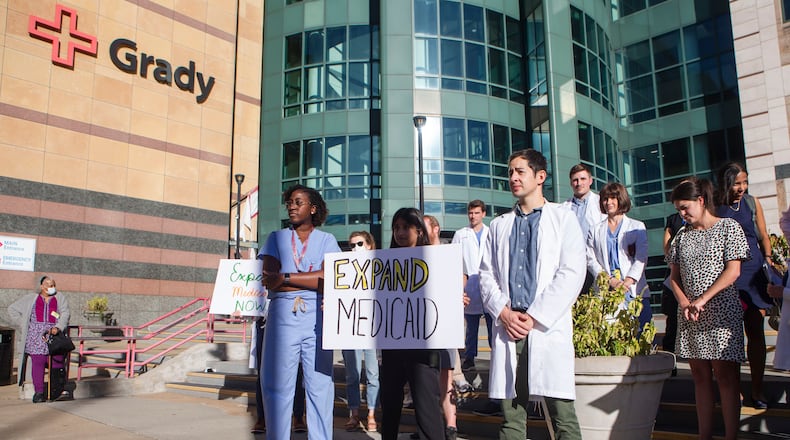Marcy Miller is worried about inflation. Every time she goes to her local Winn-Dixie on Saint Simons Island, she said, it seems prices have gone up yet again.
Ask her about health care and she pauses. “Well, yes. Health care is an issue I care about,” she said.
“But until we get the inflation fixed that’s what matters the most to me,” the 44-year-old mother of two said,
Until recently, health care loomed large over every corner of the political landscape in Georgia. For voters in the run-up to the 2018 contest between Gov. Brian Kemp and Stacey Abrams, it tied for their most important issue after the economy, according to an Atlanta Journal-Constitution poll. That was about par for Georgia elections going back years. And candidates responded, pitching high-priority health policies.
Things are more complicated now.
Worries over the economy and inflation as well as threats to democracy in the wake of the Jan. 6, 2021 attack on the Capitol are top of mind for many voters, polls show.
“I have noticed it — the drop in the focus on health care, where it always ranked number two or three” for voters, said Tom Andrews, former CEO of Atlanta-based Mercy Care charity clinics.
“I just think people are thoroughly concerned about the status of our country,” he said. “And that’s going to make the bread-and-butter issues kind of get pushed aside, because they’re not considered as bad in the minds of people who are thinking, ‘What’s going on in our country?’
If anything, experts say, the pandemic’s ravaging of the health care system should have put health care front and center. And Georgia ranks near the top of most lists for poor health outcomes and access to health care. The pandemic made a big problem even worse.
In these midterm elections, candidates for the state’s top offices are attacking the issue in different ways.
For Democrats — gubernatorial candidate Abrams and U.S. Sen. Raphael Warnock — expanding access to health care is a frequent refrain in campaign speeches.
For Republicans — Kemp and U.S. Senate hopeful Herschel Walker — the topic comes up far less often. And when it does, the focus is centered more on curbing costs.
Senate Race
As he campaigns around the state for reelection, Warnock likes to tell the story of the time he got arrested.
Back in 2014, he was one a few dozen people hauled away in handcuffs following a sit-in at the Georgia Capitol to protest the state’s refusal to expand Medicaid, the safety net insurance program that covers poor children and some elderly and disabled adults.
“I thought it was a small price to pay because I believe healthcare is a human right,” he told supporters in Marietta.
Credit: Jason Getz / Jason.Getz@ajc.com
Credit: Jason Getz / Jason.Getz@ajc.com
Asked about expanding Medicaid to all poor adults in Georgia, Walker said the program “continues to bankrupt us.”
“Right now, Medicaid has not been good,” Walker told reporters following a rally in Paulding County.
In the last year, Warnock has joined other Democrats in Congress to push through the law that will help certain Medicare patients who rely on costly drugs. Previously, there had been no limit on the amount Medicare Part D enrollees had to spend over time. Some extremely expensive drugs, like some cancer treatments, could cost tens of thousands of dollars in co-pays alone. Now those beneficiaries will have it capped at $2,000 per year when the law takes effect in 2025.
The new law also allows Medicare to negotiate prices with the drug manufacturers for the first time. Warnock had been pushing for a $35 a month cap on out-of-pocket insulin costs. But Republican opposition forced lawmakers to scale back the plan so it now applies only to Medicare recipients.
Pharmaceutical companies have argued that if Medicare doesn’t spend as much money, they may choose to reduce research on new drugs. That could lead do fewer treatments for rare diseases, they said.
Citing that and saying the government shouldn’t be in the drug pricing business, a group of Republican senators recently introduced legislation to repeal the law.
Walker has said he would have voted against the health care spending bill, saying it was too costly. But he has not provided specifics on what he would support. His campaign said he would back the GOP repeal bill because he believes increased competition and innovation would do more to bring down drug prices than government involvement.
Credit: arvin.temkar@ajc.com
Credit: arvin.temkar@ajc.com
Governor’s Race
In this year’s rematch between Abrams and Kemp, they are again dueling over health care.
As she did in 2018, Abrams has made Medicaid expansion a pivotal part of her campaign platform. A full Medicaid expansion could cover at least 400,000 additional Georgians in need of health insurance, according to estimates. Abrams said getting more Georgians on the rolls would help solve stubborn problems like economic equality.
“I’m going to talk about Medicaid expansion every chance I get,” Abrams said of her strategy.
Credit: Steve Schaefer
Credit: Steve Schaefer
Unlike 2018, Kemp now has a record he can point to. That record includes opposition to a full expansion of Medicaid, which he said would be too costly for the state in the long run and too inflexible for recipients.
“It’s an easy thing to say, but it’s going to cost a lot of money,” Kemp said.
“How is she going to pay for it? How high are taxes going to go up?” Kemp said. “It’s a one-size-fits-all government program, and there aren’t enough doctors out there to take Medicaid patients to make it profitable.”
Since he was elected, Kemp has also signed into law a bipartisan bill aiming to increase the access Georgians have to mental health and substance abuse care. Among other things, it requires insurers to cover mental health care the same way they do physical health.
And he also backed a measure which lengthened the amount of time that poor new mothers are covered by Medicaid from six months to one year. That came in response to Georgia’s dismal standing when it comes to sickness and death among women who get pregnant and give birth.
Credit: HYOSUB SHIN / AJC
Credit: HYOSUB SHIN / AJC
On the broader question of Medicaid expansion, the governor has crafted a more limited “fiscally conservative” initiative linked to work and academic requirements. According to his estimates, it would insure 50,000 Georgia adults. A federal judge recently ruled that his program can move forward over the White House’s objections.
Abrams has intensified her criticism of Kemp’s failure to act more aggressively on Medicaid after Atlanta Medical Center, one of the city’s safety-net hospitals, announced it would close in November.
The hospital’s owner, Wellstar Health System, has said it would have shuttered AMC regardless of Medicaid expansion.
But Abrams and other critics maintain the lack of Medicaid expansion still hurt AMC. In response to a letter from Georgia Democrats in Congress, Kemp on Tuesday responded with a letter citing his record. He also pointed to recent jumps in Medicaid enrollment, although those are linked to pandemic relief policies and likely to vanish when those programs end.
-Staff writer Greg Bluestein contributed to this story
Keep Reading
The Latest
Featured








